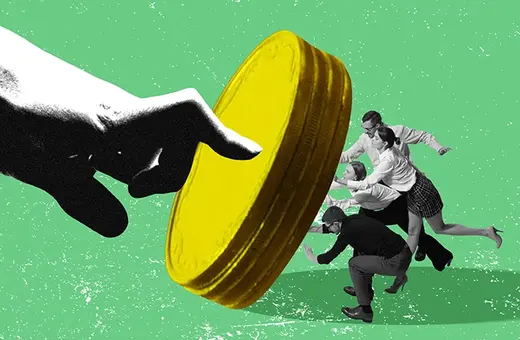It seems impossible to avoid partaking in the ills of capitalism when you’re a consumer. But some people think we still have the agency to resist the logic of the market that wants us to be acting as self-interested individuals, purchasing the best goods at the lowest price, without thinking of the collective consequences. Ethical consumerism aims to avoid some of the moral shortcomings of the market, like pollution, animal cruelty, or exploitative wages. But is it really possible to promote ethical causes simply by buying stuff? And can we really use the market to critique capitalism? Sabrina Martin thinks that despite its many problems, ethical consumerism has the potential to restructure the market's priorities.
Black Friday is a strange day: a celebration of consumerist culture, and at the same time a reminder of its ills. Images of people mobbing shopping centres in hunt of the perfect bargain can be upsetting to watch, while at the same time it’s hard to see who exactly we are benefitting if we resist doing our holiday shopping on a day when everything is on discount. It seems impossible to avoid being a consumer within a capitalist market, and thus be pushed into partaking in its often-unpalatable practices. But some people think there is a way of resisting the logic of the market that wants consumers always to be looking for the best goods at the cheapest price: ethical consumerism. Last year The Guardian reported that UK spending in the ‘ethical market’ is now worth £41bn (though statistics on this vary widely). Accenture has even predicted a new era of ethical consumerism for at least the next decade.
Ethical consumerism starts with the premise that goods and a growing number of targeted services available on the market have moral shortcomings: they may contribute to pollution or deforestation, they may perpetuate cruelty to animals, or use low-wage labour. Ethical consumers show their dissatisfaction with this status quo by purchasing products or services that don’t engage with these practices. On the face of it, it appears to be an individualist act of moralism and activism targeted at collective problems that relies on the market as its mechanism of action: ‘voting with your dollar’, as the saying goes. Yet, even the most self-interested or -regarding consumer is still, by definition, participating in a social act through the use of the market, so the individualism that we observe in ethical consumerism actually gives way to an acknowledgement of collective responsibility. So we have to ask: to what extent can the market be an effective tool for activism, and is ethical consumerism a kind of critique of capitalism, or simply another manifestation of it?
Ethical consumerism and its discontents
There are myriad criticisms to be levied against ethical consumerism, ranging from the use of the free market to advance causes of justice to the claim that the onus of justice shouldn’t and can’t fall solely on individuals, from the fact that it’s a privilege to be able to choose to consume ethically to the idea that any system that tries to redress capitalism is doomed to fail. Yet, given ethical consumerism’s growing prevalence, even among those who are critical of the movement (cards on the table: I count myself among these participant-critics), it’s worth investigating what the ideological underpinnings of the movement are.
To anti-capitalists, the use of market mechanisms to execute ethical behaviour or acts of justice seems counterintuitive and counterproductive.





















Join the conversation